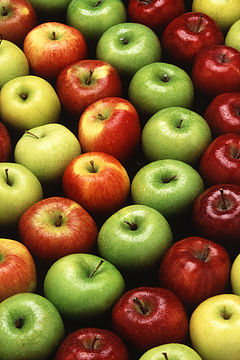The Dr. Oz Show: Apple Juice, Arsenic, and the Real Bottom Line
 I first heard about the news via my Facebook feed.
I first heard about the news via my Facebook feed.

Intrigued, I continued to follow the trending concern until the source of the information became clear.
Dr. Oz.
The first week of the fall TV season, The Dr. Oz Show chose to lead off with a shocker. He revealed the results of a study that reported many brands of commonly available apple juice contain higher arsenic levels than safely allowed in drinking water.
This claim undoubtedly caught the attention of many concerned parents.
But, not surprisingly, Dr. Oz has only succeeded in showing his lack of concern for accuracy, and his desire for sensationalized attention.
As a naturally occurring element, it should not be surprising that arsenic is found in our food supply. However, the reason the report was very alarming for some parents was because of the inflammatory way the information was presented.
The crux of this arsenic issue was that Dr. Oz’s conclusion was based on a poorly designed and misleading study. Specifically, the testing performed by Dr. Oz’s independent lab did not determine whether the arsenic found in the juice was inorganic or organic.
Inorganic vs. organic: Why does that matter?
Despite arsenic’s association with poisoning villains, organic arsenic is actually commonly found in nature. Organic arsenic is in air, water, soil. In this form, it is quickly metabolized and is eliminated from the body without causing harm.
Inorganic arsenic, however, is toxic. The FDA monitors its level because it is known to cause health problems, including cancer. This form of arsenic is used in pesticides and insecticides. Ground water, therefore, can be polluted with pesticide run-off and arsenic will accumulate in drinking water supplies.
When Dr. Oz’s independent testing reported the level of arsenic on his show, the total amount of arsenic (inorganic + organic) was reported. By not reporting percentage of organic to inorganic, the results inflates the concern of the toxic chemical being found in juice.
The FDA has rejected the results of his investigation, stating that apple juice has been repeatedly tested and is not found to be causing any harm. Dr. Oz, however, is not backing down on his claim. He contests that the public needs to know what chemicals and additives are in the foods we eat.
I agree.
But, I also believe accurately reporting results in a way that creates fair comparison is of more value.
Dr. Oz did make the following statement after the airing of his show:
There's no question in my mind folks can continue drinking apple juice. ... There have been no cases at all of kids being harmed by elevated levels of arsenic, and the kinds of numbers we are talking about are not high enough to cause acute injury.
So, which is it? Shockingly harmful, or a safe beverage? It seems like Dr. Oz is unsure himself.
No matter your feelings about Dr. Oz, or the FDA, a better use of media space is discussing the concerns of juice consumption rather than juice contamination.
Despite the cleaver labeling of most commercial juices, there are NO, NO, NO nutritional benefits in juice that are not present in the whole fruit. And whole fruit contains fiber and nutrients that are stripped out of any (yes, even organic) juice concentrate.
Juice is not needed by infants and should never be put in a baby bottle. Juice is not good when kids are dehydrated, nor does it help diarrhea. Juice is associated with developing cavities. And consuming sweetened beverages, including juice, leads to weight gain.
The bottom line... Kids really don’t need juice, anyway.
For quality health care information, choose your sources wisely. Listen to those who are motivated by your child’s best interest, not by their bottom line. And until we see what The Dr. Oz Show is digging up next, make a positive health choice for your family regardless of the controversy.

